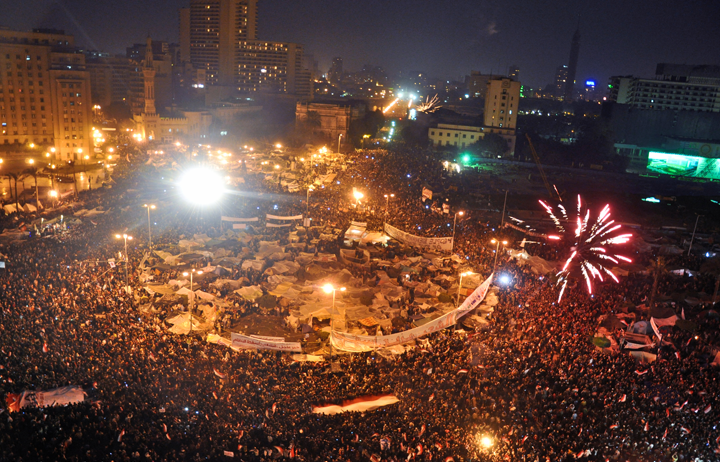
After former Egyptian President Hosni Mubarak was toppled in February 2011, the Supreme Council for the Armed Forces assumed executive power in Egypt, and launched the ‘transitional period.’ In the seemingly boundless space created by Mubarak’s absence, millions of citizens freely debated every aspect of the emerging political and social order, in public meetings, at home, in the media, and on the streets. It was a time of limitless imagination. Meanwhile, amongst international and Egyptian human rights organisations, a more contained conversation began on the practice and precedents of transitional justice.
Cairo soon played host to major conferences on the subject. In these meetings, three central assumptions were regularly made, particularly by international participants. First, transitional justice precedents offer the necessary prescriptions for Egypt at this time. Second, the Egyptian people are unaware of this and need educating accordingly. Third, and underpinning the rest, the most deceptively straightforward premise: Egypt’s transition is underway. But as the conference proceedings showed and events since have confirmed, these premises should actually have been posed as questions.
Do international transitional justice precedents suit the Egyptian case?
In 2011, Egyptian demonstrators proclaimed revolution and not reform. The slogan they borrowed from their Tunisian forerunners was ‘The People Want the Fall of the Regime,’ where the Arabic word for ‘regime,’ al-nizam, also connotes ‘order’ or ‘system.’ By contrast, transitional justice offers mechanisms for a more conservative conception of transition, confined within the realms of criminal law and political reform. Several studies have reflected on the limits of this standardisation.
Two neglected areas resonate particularly in Egypt. First, as with the US occupation in Iraq, and NATO in Kosovo, transitional justice practice rarely highlights the accountability of external actors. American and European governments are often held up as ideal-types, while developing state actors are scrutinised, reinforcing existing imbalances of power. The Mubarak regime’s collaboration with London and Washington — not least on extraordinary rendition — is a case in point. Significantly, anAmerican National Lawyers Guild delegation recently visited Egypt to document the role of US government and corporations in human rights abuses.
Another neglected question concerns the kind of injustice being righted. In Egypt, violations in the field of social and economic rights abound. Accepting his first IMF package in 1991, Mubarak had established a neoliberal order which flouted several international economic rights conventions on unionisation, child labour, gendered wage discrimination, and migrant labour. And yet, in transitional justice practice, critiques of crony capitalist interests as culpable are rare.
Do Egyptians need an education in transitional justice?
If the Mubarak regime’s violations outstrip conventional transitional justice provisions, then the assumption that Egyptian society needs an education in it appears flawed. Certainly, knowledge of international precedents only enriches public debate. Yet Egyptians’ intimate understanding of the crimes committed by the Mubarak regime, and of potential remedies, was made clear in the slogans and demands of the revolution’s opening 18 days. Protests were called against ‘Torture, Corruption, Poverty, and Unemployment’ on Police Day, and the chant ‘Bread, Freedom, Human Dignity,’ popularised. As rights activist Hossam Bahgat recalled, by condemning the authorities’ violation of political, civic, social, and economic rights together, Egyptians had ‘completely surpassed’ the artificial sequencing of rights debate.
Protesters’ earliest demands were for the trials of old regime members, overhaul of state institutions, and reparations for victims of state violence. They displayed a clear preference for retributive justice — al-qasas — over the non-judicial prescriptions of some international practitioners, such as truth and reconciliation commissions. But beyond these transitional justice-related themes, they also demanded representative government, autonomy from Washington in policymaking, and social justice. Civil society campaigns targeted military trials, state media, odious debt, stolen public funds, and injustice in the workplace. These millions of Egyptians envisioned fundamental socio-political change.
Is Egypt really ‘in transition’?
Clearly, then, there are differences in scope between reformist and revolutionary conceptions of transition. Yet the paradox that Egyptians are experiencing today is the sheer ephemerality of that transition. In most successful transitional justice cases, one common condition is the existence of the political will to propel the process. In Egypt, the military council simply lacks that political will, and has presided over a year and counting of military trials for civilians, repression of demonstrations, and media censorship.
As of their constitutional declaration in March 2011, the generals enjoyed full executive powers. Citizens have been disappointed at the outcomes of former regime members’ trials, and the lack of vetting, whether in Egypt’s police apparatus, prison system, or official media. Meanwhile, recently negotiated IMF packages carefully preserve the neoliberal status quo.
During the presidential elections in June 2012, the generals issued yet another constitutional declaration, which stripped the presidency of many of its powers. The elections themselves were invalidated in the eyes of many by the candidacies of two former regime members, and the lack of oversight regarding campaign funds and tactics. In this context, the victory of Muslim Brother Muhammad Mursi left both his powers and allegiances very much in question, particularly due to the Brotherhood’s silence during and perceived complicity in the military council’s repression.
Today, Egypt’s transition is at best suspended, and over the past months, transitional justice mechanisms like trials and reparations have been selectively developed by a state elite that is untransformed. Hence the activists’ mantra, ‘the revolution continues’ (al-thawra mustamira), and the continued protests against the ‘remnants’ (fulul) of the Mubarak regime.
Looking Forward
However well-intentioned their efforts then, a warning note must be sounded to those interested in transitional justice in Egypt today. Pushing this agenda when its principal precondition, political will, is absent risks legitimising a ‘transitional’ order little different from the old. Consequently, most Egyptian activists have maintained that the transition has yet to come, and have advised international colleagues not to engage the military council.
This situation has only been exacerbated by the election of Mursi, which should have signalled the end of the transition, but which has not been received as such, due to the flawed electoral process, and the military council’s ongoing domination of executive powers in Egypt. A case in point came with Mursi’s decree to reconvene parliament on Sunday – it had been dominated by members of his own organisation, and dissolved with the approval of the military council in June 2012. By Monday, the military council had shot down Mursi’s decision and issued the president a warning. Meanwhile, political and legal activists urged him to use his position to free those in military prisons since 2011, that is, to begin what might resemble a transitional justice process earnestly.
The Egyptian revolution’s demands, however contested, transcended the bounds of reformist transitional justice practice. Egyptian rights activists have resourcefully incorporated transitional justice principles into their campaigns, while aiming at more far-reaching goals and showing their international colleagues how to support them. Indeed, the revolution is further proof that there is no ‘one-size-fits-all’ remedy for transitional justice: it is preferable to promote ‘local’ formulae in light of global experience, rather than vice versa. Today, as varying levels of mobilization recall Mubarak’s last years in power, the call for transitional justice may have to become a strategy for political pressure in Egypt, before it can become a process for genuine change.
This article originally appeared on the OUP Blog. It is reposted with their permission.
Reem Abou-El-Fadl is Jarvis Doctorow Junior Research Fellow in International Relations and Conflict Resolution in the Middle East at St Edmund Hall and the Department of Politics and International Relations, Oxford University. She is the author of “Beyond Conventional Transitional Justice: Egypt’s 2011 Revolution and the Absence of Political Will” in the International Journal of Transitional Justice, which is free to read for a limited time. Her research interests include Egyptian, Turkish and Palestinian political history, and the foreign policymaking of developing states. Her most recent publications examine Anti-Zionism and Palestine in the 2011 Egyptian Revolution and Arab perceptions of contemporary Turkish foreign policy. Her current research examines Egyptian support for the Palestinian cause in the 1960s and 1970s.







1 Comment